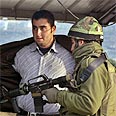
A roadblock army
Police duties at West Bank checkpoints made IDF weaker
The moment the second Lebanon war ended, and in fact even before that, a difficult and grim question emerged: What happened to our great, mighty army? Why is it that 40 years ago it managed to beat the armies of three states in a matter of days, while this time around it failed to defeat a small military force despite getting plenty of time to accomplish the mission?
Various answers have been presented. One of them has to do with personalities: The prime minister is brash, the defense minister is a rookie, and the chief of staff is arrogant. A second answer has to do with the state of the army: It wasn't trained to achieve the war's objectives. We can find more answers for this bothersome question, and the debate over it will continue for a long time, attesting to the depth of the crisis in the wake of this war.
However, the decisive answer is unrelated to concrete, current-day developments, but rather, to the basic process taking place in the IDF. This process started many years ago, immediately following the Six Days War.
What kind of army do we want?
The results of that war forced the IDF to deal with a new mission, which is not military but rather police-like: Governing over the hundreds of thousands residing in the new territories that were occupied. In the early years, when the absurd phrase "enlightened occupation" was commonly accepted, the army attempted to remain largely uninvolved in residents' live and didn't have to deploy large forces for policing missions.
In the 1980s the situation changed because of two reasons: One – the process of establishing settlements at the heart of the West Bank that began at this time. The army was forced to deploy large forces to protect them, and particularly the small and isolated communities that featured more soldiers than settlers. The defense minister at the time, Yitzhak Rabin, described the situation angrily: "When there's a ballet class at one of the settlements, I need to dispatch an IDF company to guard it."
Beyond this, settler leaders became the army's masters in practice. They had the political power to annul inconvenient military decisions.
The second reason was the outbreak of the first Intifada. Until then, the military price for maintaining the occupation was relatively low, but since then it has grown increasingly steeper and increasingly intolerable. The phrase "steep price" has two implications: The first is a simple one: The number of units dealing with policing duties has grown at a huge rate. Until then, only one brigade was able to control the entire Judea and Samaria region. By now, a whole division is needed. The second meaning is deeper and more complex: The change in the nature of military missions. Even before that the army was dealing with magnificent operations such as searches, arrests, and the occasional curfews, but since then, those have became a significant part of its missions.
In the distant past, phrases and terms such as "the best ones to flight school," military posts, strongholds, and ambushes symbolized the IDF. Today, the clear symbol of the army's activity is the roadblock. The world of values such checkpoints stem from attests to the corrupt and dangerous process taking place in the army. Soldiers whose time was dedicated to defending one radical settlement or another and screening miserable Palestinians at some remote roadblock are unable to really deal with missions related to Israeli security.
We saw and learned this bitter truth back in the first Lebanon war – back then we already grasped occupation's terrible price. And now, another cursed war raises the simple question: What do we want – a defense force or a roadblock force?
Professor Yechiam Weitz heads the Land of Israel Studies Department at the University of Haifa










